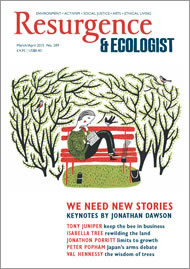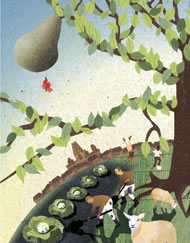Food plays an important role in religious life, both in worship and as part of a faith-consistent lifestyle. It is a meal – the sharing of bread and wine – that is at the heart of the Christian mass, while for nearly 3,000 years Jewish and Muslim lifestyles have been governed by the rules around what is kosher or halal (fit to eat).
All over the world, the year’s cycle is marked by the special dishes served at religious festivals, from chocolate eggs at Easter to the burfi sweets eaten during Diwali, the festival of lights celebrated by Hindus, Jains and Sikhs. But while the major faiths celebrate food as a gift of the divine, they have been slow to recognise the environmental impact of the food we eat. The truth is that eating is a moral act. Every mouthful we take comes with an invisible trail of consequences – on other people, animals, the land and even ourselves.
Consider this: up to 30% of our individual carbon footprint comes from the food we eat, from farm gate to dinner plate, according to Patrick Holden of the Sustainable Food Trust. Agriculture influences the way half the world’s habitable land is cared for and two-thirds of its fresh water is used. The industrialisation of farming has greatly boosted crop yields but at huge cost to the environment. Worldwide, soils are increasingly degraded, water sources polluted, and biodiversity under threat.
We must find a way to feed ourselves without trashing the Earth. That’s why people of faith are increasingly asking if their food reflects their beliefs and values.
The good news is that most of us get the chance to honour our values three times a day. Consuming more fresh vegetables, eating less meat, cooking from scratch, growing our own herbs, eating seasonally, walking to the shops instead of driving, buying fairly traded food or free-range eggs: each is a vote for a healthier, more sustainable food and farming system that has the added advantage of a healthier, more sustainable us.
And these daily votes really do make a difference. Sixth-generation American farmer Harry Stoddart says: “You, as an eater, have more power over the food system than governments or multinational corporations, because collectively, eaters spend more than either,” and, “When you eat, you are swallowing the future – literally and figuratively… Your food choices today will influence what is produced in the future.”
Recipe: Matzo Balls
Matzo balls are little dumplings made from matzo meal. They are often eaten during Passover (Pesach in Hebrew), one of the most important festivals in the Jewish year. Use fairly traded, free-range ingredients wherever possible.
Makes 12 to 15 matzo balls
Ingredients
4 eggs
120ml soda water
2 tbsp vegetable oil or chicken fat (schmaltz)
salt and freshly ground black pepper
2 tbsp finely chopped parsley
30g ground almonds or walnuts
1 tsp almond or walnut oil
4 or 5 scrapes of freshly grated nutmeg
125g matzo meal
Method
Whisk the eggs until blended. Add the soda water, vegetable oil or chicken fat, salt (sparingly) and pepper. Blend in the parsley, almonds or walnuts, almond or walnut oil, nutmeg and matzo meal. Cover and refrigerate for about an hour.
Bring a large saucepan of salted water to the boil. Rub a little oil on your hands and form the mixture into balls, using about 2 tablespoonsful for each one. Drop into the boiling water and simmer, covered, for 25 to 35 minutes. The matzo balls are often served in a broth.







